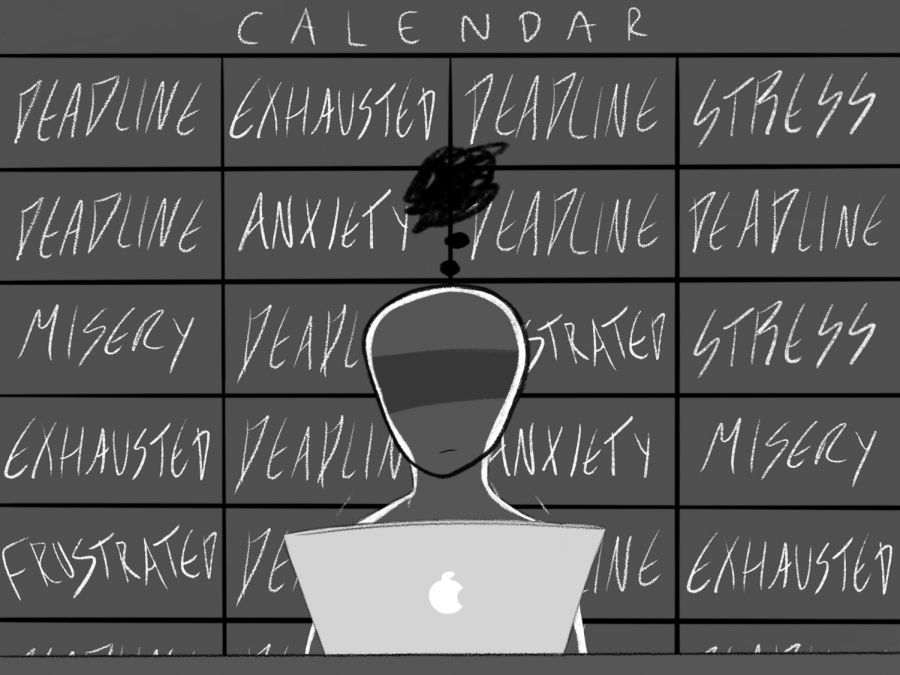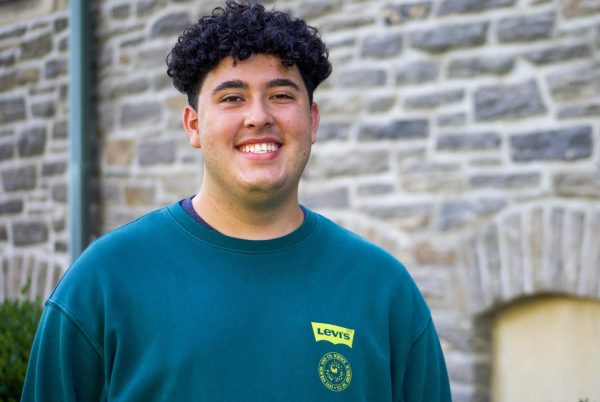Workload negatively affects mental health
Matthias Sandoval argues that Masters students struggle with a heavy workload which negatively impacts their mental health.
November 19, 2021
The school year only started two months ago and students are already overwhelmed. That’s not a good sign for what’s to come.
In a survey conducted by Tower, in which 148 upper school students participated, 43.2% say they have more work than expected, and 20.9% said they have too much work. 31.8% of students say they have a fair amount of work and 4.1% of them say they have less work than expected. 64.1% of students think they have more than a “fair” amount of work which is very upsetting and in my opinion, outrageous.
Having too much work could really have negative implications on a students mental health. Having too much work adds unnecessary stress, limits students’ social life, and can limit students’ time for leisure. With the school day being 9 hours long (8:30-5:30 assuming students have co-curriculars) then having to travel home to do 2-5 hours of work, it barely gives students time to sit and enjoy a meal or spend time with loved ones. If students want to make time for leisure, they have to sacrifice their sleep and stay up till almost 1-2 in the morning. Sacrificing sleep is in no way a small issue. Sleep is absolutely crucial to the health and well-being of a teenager as The American Academy of Sleep Medicine has recommended that teenagers should get 8-10 hours of sleep a night. There is no way that any Masters student could get 8-10 hours of sleep with the amount of work we get.
Senior Caleb Jakes is a very active member in the community. He is the Co-chair of the school and is the founder and Co-chair of SCEEM and ONYX. Jakes believes that the workload this year has taken a toll on his mental health. It’s currently college application season, and many seniors like him are stressed over their college applications on top of the added work they have to do right now.
Jakes said, “I feel like it definitely did [affect my mental health]. I feel like at the beginning of the year, especially getting started with stuff, starting to get the workload, and then like trying to get my shoes into this co-chair role. It added an immense amount of stress, trying to balance both trying to stay on my toes and not crash before October.”
Jakes also noted that the switch from being online last year to being in school fully in-person now has added to lots of students’ stress.
He said, “Think about it. You have a school day that’s set up from 8 to 3:35. Then you go do something else that’s required from 3:45 to 5:45. And then I feel bad for the people who have to travel back home and can’t have time with family or talk to a friend and then they have to do their homework, eat dinner. And if it’s two-plus hours on homework, then what are they really having left after the school day?”.
Jakes is right as students have had to adjust from being online and participating in shortened and inconsistent co-curriculars. The adjustment to having in-person school and consistent co-curriculars has made this year even more difficult for students who have had trouble with getting too many hours of work even during “normal” school years in the past.
Junior Josh Markowitz, is also another active community member as he’s on the boys varsity soccer team. He shared the same sentiments as Jakes. He also feels overwhelmed by the amount of work. Markowitz gets anywhere from 2-5 hours of work a night. Markowitz feels that teachers don’t take into consideration the fact that students have work for other classes to complete and other activities and obligations students need to attend both in and out of school everyday.
Markowitz said, “Every teacher thinks that you are on top of balancing work, co-curriculars, and having a normal life outside of school. Every teacher assigns assignments like that’s the only class you take and that’s the only homework you have to do but in reality you have 6-7 teachers doing that and it all piles up on top of each other and it gets really out of hand.”
Markowitz feels that getting lots of work is affecting his mental health as well. He said that the way school is going for him determines how his mental health is. Markowitz said, “school would just be the biggest factor of my mental health. If school was going well, my mental health would generally be higher, but if school was going worse, with more pressure or more work, it would generally go lower”.
The National Education Association and the National PTA both support the 10 minute rule. The 10 minute rule states that for each grade level you should get about 10 minutes of homework a day. According to their recommendations, seniors shouldn’t receive more than 2 hours of homework a night but a lot of Masters students, ranging anywhere from grades 9-12 are getting 2+ hours of homework a night. That alone is proof enough that Masters is overworking and overstressing their students.
School Counselor, Stefanie Carbone believes that this is very much a systematic issue. Carbone said, “While I am not in the classroom full time, nor am I an administrator, I believe this conversation needs to occur beyond the walls of the Counseling Center. For a change in stress levels as well as addressing the mental health needs of our students to occur, I think this needs to be presented as a systemic concern to be approached and solved on all levels including teachers, department chairs, and administrators in collaboration with the Counseling Center and the Mental Health at Masters Club leaders.”
Carbone is absolutely correct. This is a systemic issue. It’s a type of issue that needs to be addressed publicly with open and honest dialogue between students, parents, teachers, and administration. Should this issue be addressed properly with real change, we can all help contribute to Masters being a healthier work environment, inside and outside the classroom for all of its students in years to come.




